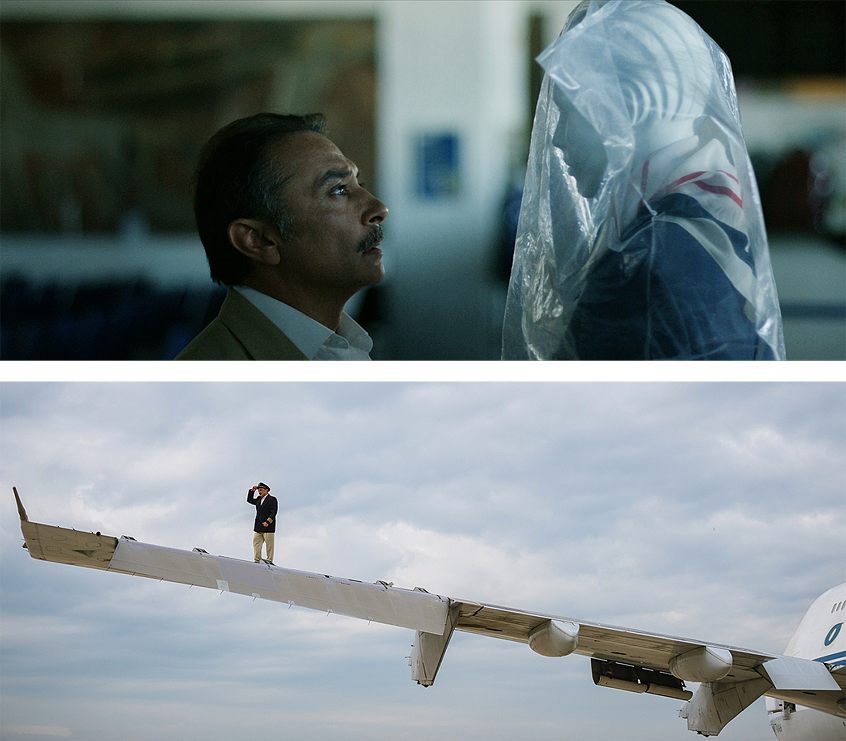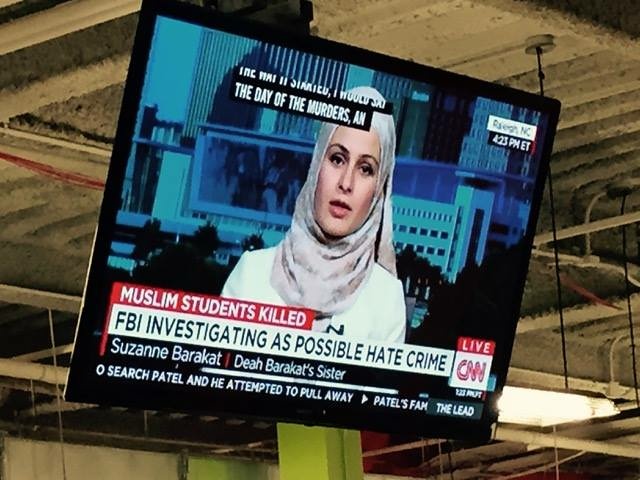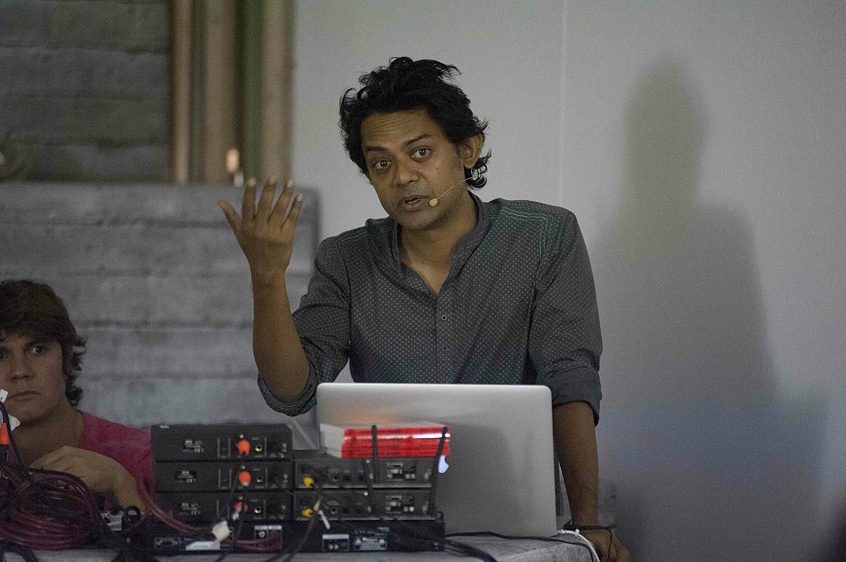This four-evening seminar started from the desire to unpack some of the forgotten languages, broken dreams, and uncanny hopes that appear in Naeem Mohaiemen’s film for documenta 14 Kassel, Two Meetings and a Funeral (on view at Landesmuseum). The Parliament of Bodies invites Naeem Mohaiemen in conversation with the three protagonists of the film to discuss speculative and practical ways of reviving the idea of a Global Left, learning from the fatal errors of the past.
August 1
7–8:30 pm
Talk by Vijay Prashad, followed by discussion
8:30–9 pm
Film Screening: Hiwa K, The Existentialist Scene in Kurdistan [Raw Materiality] (2007–present); Hiwa K, This Lemon Tastes of Apple (2011)
9–10 pm
Post-film discussion
August 2
7–8:30 pm
Talk by Samia Zennadi, followed by discussion
8:30–9 pm
Film Screening: Excerpt from Didem Pekün / Barış Doğrusöz, Tülay German: Years of Fire and Cinders, 2010
9–10 pm
Discussion
August 3
7–8:30 pm
Talk by Zonayed Saki, followed by discussion
8:30–9 pm
Film Screening: Excerpt from Fernando Solanas / Octavio Getino, Hour of the Furnaces (1968)
9–10 pm
Discussion
August 4
7–8:30 pm
Talk by Naeem Mohaiemen, with excerpts from The Young Man Was series (2006-present), followed by discussion
8:30–9:30 pm
Film Screening: belit sağ, Sept. - Oct. 2015, Cizre (2015); excerpt from Sam Green / Bill Siegel, The Weather Underground (2002)
9:30–10 pm
Discussion
The seminars take as a starting point the idea of a “pivot” (event/ideology/leader) in world history. In Two Meetings and a Funeral, Naeem Mohaiemen argues that the 1973 Nonaligned Movement meeting in Algiers was such a pivot point. While this meeting was celebrated as the “radical NAM” that championed liberation for Portuguese colonies, South Africa, and Palestine, it was also the event where countries within Third World Internationalism (at the intersection with socialism) began to slide toward religious alliances (in this case, Islamism) as a solidarity form. While the presence of Latin America, Africa, and parts of Asia made this not fully possible in 1973, the 1974 Organization of Islamic Cooperation meeting in Lahore completed the pivot. The consequences unfold within the next two decades, with Islamism, and the possibility of religion-based unity replacing socialism as a driving force in parts of the Global South. Was such a path inevitable for the socialist project in the Muslim Third World, and if so how did it alter the course of world socialism between 1973 and 1989?
At the 1973 Nonaligned Movement Summit in Algiers, Singapore’s Sinnathamby Rajaratnam reflected on the 1972 signing of SALT I (Strategic Arms Limitation Talks) between cold warriors United States and Soviet Union: “It is an intermission between the old Cold War and the new Cold Wars looming over the horizon.” These words are prophetic today as the world is in the grips of an unending series of wars, a military-industrial complex endlessly renewing the “enemy,” and power struggles between the old cold warriors and many new kings and pawns on the chessboard. Faced with this global crisis, writers, artists, and academics have been exploring many of the antecedents, orphans, and heirs of the era of decolonization–including Bandung, the Nonaligned Movement, Third World Liberation, and World Socialism. On one level, this is an exercise in memory, and against forgetting. But on another level, it is a search for philosophies that may unite across the separations of Stuart Hall’s fateful triangle–race, ethnicity, and nation (to which we may add the fourth Venn diagram, intersection of religion).
Among several questions we will consider are:
- The Third Worldist impulse, especially from Latin America, was in the 1960s thought to be a match ready to light the fuse of world revolution. How can we revive that possibility, and where should our eyes be faced? Where in other words should we be searching for the next spark?
- The role of faith-based forms of collective subjectivity were sometimes dismissed by the Third World left as an opiate of the masses. Was this a historic mistake, or the only ideologically consistent option? What spaces were left unclaimed as a result of this, and which forces entered these spaces?
- Fear, paranoia, and accompanying security concerns have been tools of rightist, ethnonationalist, and religious groups for almost a century now. The left has been in a defensive role, trying to puncture such fears. What other roles are there for the left in this crisis?
- What is the role of the leftist organizer in recollecting history? Is nostalgia or accuracy the more important imperative? Does talking about the past in unflinching tones have a progressive possibility as well?
Broadcast on Every Time A Ear di Soun: August 22-24, 2017, 15:00–16:00 (UTC-4)
Vijay Prashad is Professor of International Studies at Trinity College. He is the author of over twenty books, including his long history of the twentieth and twenty-first centuries: The Darker Nations: A People’s History of the Third World and The Poorer Nations: A Possible History of the Global South and his books on Arab politics, including Arab Spring, Libyan Winter, and The Death of the Nation and the Future of the Arab Revolution. His edited books include Will the Flower Slip Through the Asphalt, which includes essays on climate and capitalism by Naomi Klein, Rafia Zakaria and Susan Abulhawa, among others, as well as Red October: The Russian Revolution and the Communist Horizon, with essays by Prabhat Patnaik, Prakash Karat, Jodi Dean, Shahrzad Mojab, and Irfan Habib, among others. He is a reporter for Frontline, The Hindu, BirGün, and Alternet. He is the Chief Editor of LeftWord Books (New Delhi) and a Member of the Communist Party of India (Marxist).
Samia Zennadi is a left ecofeminist from Algeria, and an archaeologist by training. She is a former member of the organizing committee of the International Festival of Literature and Youth Book (2008 to 2010). She is responsible for “L’Espace Panaf” at the 15th International Book Fair of Algiers during which she initiated a literary magazine “L’Afrique parle livres” (Africa speaks books). Zennadi is the author of the paper “Camus’s caravan, or domestication by culture,” which follows the protest against the proposed Camus Caravan to Algeria. She also co-wrote “Alert to the anticolonialist consciences.” In Algiers, she organized the “Esprit Frantz Fanon,” a residency for writing on the actuality of the thoughts of Fanon. She is a publisher and author of a book on the art of carpeting in Algeria. Zennadi organized, in collaboration with the Third World Forum and the World Forum of Alternatives, the event “The South, what alternatives?” She is currently planning a conference in Algeria to commemorate the 1973 Non-Aligned Movement Summit.
Zonayed Saki came into politics through the 1990 democracy movement that overthrew a decade-long military regime in Bangladesh. He then joined leading left student organization Bangladesh Chhatra Federation, becoming its President in 1998. The Federation campaigned against sexual harassment on campus, the commercialization of public education, and environmental destruction— all of which became part of his future electoral platform. Saki then founded the political party Gano Samhati Andolon, and became the central committee member of the anti-imperialist Committee for Protecting National Resources against foreign and domestic plundering. The committee successfully blocked the Phulbari coal mining project, and for the last five years has led a national campaign against a proposed Indian coal plant next to the UNESCO world heritage site Sundarbans forest. In 2015, he ran for Mayor of the city of Dhaka, but rejected the election results after allegations of widespread vote rigging by the government. He is the editor of the left critical thinking publishing house Samhati and is the co-founder of the Democratic Left Alliance of Bangladeshi parties.
Naeem Mohaiemen combines essays, films, and mixed media installations to research borders, wars, and belonging within the decolonization milestones of 1947 (India-Pakistan) and 1971 (Pakistan-Bangladesh), and various conjunctures of the Third World Internationalism and Socialism project. In spite of making films that underscore a leftist tendency (in uprisings against power and in state power) toward misrecognition, a hope for an as-yet unborn global left, as the only possible alternative to silos of race and religion, is the ideological basis for his work. Chapters have shown at the Sharjah, Kochi, Marrakech, and Venice Biennales, Kiran Nadar Museum, and Museum of Modern Art, New York. The latest chapter is Two Meetings and a Funeral on view at documenta 14 Kassel (twinned with Tripoli Cancelled at documenta 14 Athens). Naeem is a PhD candidate in Anthropology at Columbia University, researching left histories outside state patronage, including that of Zonayed Saki’s political party.



